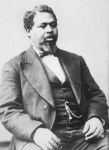Week of May 7-13
May 7
1800—On this date the founder of the settlement, which would grow to become the city of Chicago, Jean Baptiste Pointe Du Sable, sold his property and left the settlement. The Haitian-born frontier trader and businessman would die 18 years later in St. Charles, Mo.
1878—Black inventor, J.R. Winters, receives a patent for his designing of the fire escape ladder.
 |
|
ROBERT SMALLS
|
May 8
1858—The first play by an African-American writer is published. The play was titled “The Escape” and the author was William Wells Brown.
1925—The Brotherhood of Sleeping Car Porters is founded. The Brotherhood would become the leading Black-led trade union organization in America. In addition to introducing unionism to African-Americans, the ability to travel to cities throughout the country enabled the porters to become a major vehicle of communications for American Blacks. They distributed everything from letters to Black-oriented newspapers as they traveled the nation. The chief organizer was the legendary A. Phillip Randolph.
May 9
1952—The boxer-turned-actor Canada Lee dies in New York City at the age of 45. Second only to the legendary Paul Robeson, Lee was the leading serious (non-comedic) Black actor of the 1940s. He gave impressive performances in Alfred Hitchcock’s thriller “Lifeboat” (1944), the boxing classic “Body and Soul” (1947) and “Cry, The Beloved Country” (1951). However, like Robeson, Lee’s film career came to an end during the McCarthy era when a host of Black and White stars, who were also social activists, were labeled communists and denied jobs.
May 10
1837—P.B.S. Pinchback is born in Macon, Ga. to a White plantation owner and a free Black woman. He became one of the leading Black politicians of the Reconstruction era, especially in Louisiana. After the Civil War, he became lieutenant governor of Louisiana and actually served as governor for 43 days. He was later elected to both the U.S. House of Representatives and the U.S. Senate. He would also play a significant role in the establishment of Southern University and a major Black newspaper known as the Louisianan.
1994—After being released from 27 years of imprisonment for his battles against the racist system of apartheid, Nelson Mandela is elected the first Black president of South Africa.
May 11
1933—Nation of Islam leader Louis Farrakhan is born Eugene Walcott on this day in the Bronx, N.Y. He was raised by his St. Kitts-born mother in Roxbury, Mass. Prior to joining the Nation of Islam in 1955, Walcott had achieved celebrity status in the Boston area as a Calypso singer, dancer and violinist known as “The Charmer.”
1968—Nine caravans of protesters arrive in Washington, D.C. for the first phase of the Poor Peoples Campaign—an anti-poverty effort conceived by Dr. Martin Luther King Jr. The campaign aimed to unite Black, White and Hispanic poor people in an effort to pressure the government to do more to eliminate poverty in America. King had been assassinated the previous April, so the campaign was led by his lieutenant Rev. Ralph Abernathy. The campaign erected Resurrection City near the Lincoln Monument and held daily demonstrations in Washington from May 14 to June 24.
May 12
1862—In a bold and heroic endeavor, Robert Smalls led 12 other slaves in the stealing of a Confederate war ship and turning it over to Union forces. The White captain of the steamer Planter and other officers had gone ashore for a party in Charleston, S.C. Smalls, a wheelman, quickly organized the Black crew and steered the ship out of Charleston harbor right past the unsuspecting Confederate forces. For his daring deed, Smalls was commissioned a Second lieutenant. After the Civil War, he was elected congressman from South Carolina.
1940—Jazz singer Al Jarreau is born on this day in Milwaukee, Wis.
May 13
1865—The last battle of the Civil war ends. Ironically, it appears that Confederate troops won the battle at Palmetto Ranch, Texas. However, it was the actions and bravery of the 62nd Regiment of United States Colored Troops that prevented the defeat from turning into a rout. The Confederates had actually underestimated the fighting prowess of the Blacks, assuming they would run in fear when the fighting started. Instead, what occurred was the rapid defeat of two White regiments. The Black soldiers of the 62nd held firm. The Confederates would later surrender.
1950—Singer-songwriter Stevie Wonder is born Steveland Judkins in Saginaw, Mich. Wonder has recorded 30 Top Ten hits and has won 24 Grammy awards—a record for any living artist.
(This Week in Black History is compiled by Robert Taylor. He welcomes comments and questions at SirajT12@yahoo.com or brief messages at 202-657-8872.)